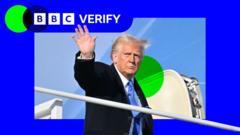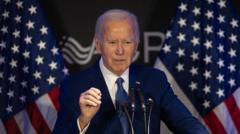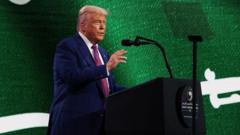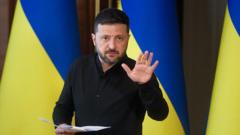The encounter marks a significant diplomatic turn that could reshape U.S.-Syria relations and alleviate hardships faced by Syrians following years of conflict.
**Trump's Engagement with Syria's Leadership Sparks New Hope Amidst Easing Sanctions**

**Trump's Engagement with Syria's Leadership Sparks New Hope Amidst Easing Sanctions**
Trump's potential shift towards Syria normalization fuels optimism among Syrians after meeting with interim President Ahmed al-Sharaa.
In a surprising turn of events, former President Donald Trump met with Syria's interim leader, Ahmed al-Sharaa, in Riyadh, marking a pivotal moment in U.S.-Syria relations. This meeting, once deemed unlikely, comes as Trump considers normalizing diplomatic ties with Syria. "I think he has got the potential," Trump stated after engaging Sharaa in a 37-minute discussion at a Saudi royal palace, a discourse witnessed by Saudi Crown Prince Mohammad bin Salman and Turkish President Recep Tayyip Erdogan via phone.
This unexpected rapprochement took place during Trump's four-day Gulf tour, where he acknowledged the influence of the Saudi and Turkish leaders in encouraging a shift in U.S. policy regarding Syria. In a notable policy reversal announced at a major investment forum, Trump declared plans to lift strict U.S. sanctions that have crippled the Syrian economy, eliciting applause from attendees.
Trump's decision aligns with growing sentiments among Syrian officials, such as Hind Kabawat, the minister of social affairs, who expressed optimism about the U.S. actions providing "a new light at the end of this tunnel." Sanctions relief could potentially stimulate international aid, foreign investment, and a path for millions of Syrian expatriates to consider returning to their homeland.
While some sanctions may be promptly lifted through presidential waivers, experts warn that dismantling the comprehensive sanctions framework will demand significant effort from the U.S. administration. This complicated process mirrors the experiences seen with Iran post-nuclear deal, where challenges persisted even after sanctions were eased.
Moreover, regional dynamics are shifting, prompting allies like Saudi Arabia and Turkey to venture into the emerging political landscape of Syria. However, Trump seems to propose a conditional normalization, with expectations for Syria to engage in the Abraham Accords, a process of normalizing relations with Israel that has gained traction among several Arab nations.
Despite the hopeful climate surrounding Sharaa's leadership and the envisioned stability, challenges remain formidable, including pressures to eliminate foreign military presence and wider integration into international frameworks. Nevertheless, President Trump characterized this moment as "a chance at greatness," while many Syrians await tangible improvements in their daily lives following years of despair.
This unexpected rapprochement took place during Trump's four-day Gulf tour, where he acknowledged the influence of the Saudi and Turkish leaders in encouraging a shift in U.S. policy regarding Syria. In a notable policy reversal announced at a major investment forum, Trump declared plans to lift strict U.S. sanctions that have crippled the Syrian economy, eliciting applause from attendees.
Trump's decision aligns with growing sentiments among Syrian officials, such as Hind Kabawat, the minister of social affairs, who expressed optimism about the U.S. actions providing "a new light at the end of this tunnel." Sanctions relief could potentially stimulate international aid, foreign investment, and a path for millions of Syrian expatriates to consider returning to their homeland.
While some sanctions may be promptly lifted through presidential waivers, experts warn that dismantling the comprehensive sanctions framework will demand significant effort from the U.S. administration. This complicated process mirrors the experiences seen with Iran post-nuclear deal, where challenges persisted even after sanctions were eased.
Moreover, regional dynamics are shifting, prompting allies like Saudi Arabia and Turkey to venture into the emerging political landscape of Syria. However, Trump seems to propose a conditional normalization, with expectations for Syria to engage in the Abraham Accords, a process of normalizing relations with Israel that has gained traction among several Arab nations.
Despite the hopeful climate surrounding Sharaa's leadership and the envisioned stability, challenges remain formidable, including pressures to eliminate foreign military presence and wider integration into international frameworks. Nevertheless, President Trump characterized this moment as "a chance at greatness," while many Syrians await tangible improvements in their daily lives following years of despair.






















